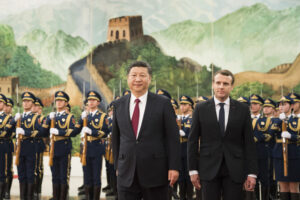New Zealand’s prime minister, Chris Hipkins, had a bumpy ride on his recent trip to China. Not only because of technical issues with his official plane — the defence aircraft used by the PM keeps breaking down, so the delegation flew to Beijing with a back-up — but also because of what he has, and hasn’t, been saying.
On the eve of last week’s trip, Hipkins declined to follow Joe Biden’s lead in calling Xi Jinping a “dictator”, awkwardly claiming that he couldn’t offer an assessment because he hadn’t met him yet, before adding that if the Chinese people wanted to change their system of government, then “that would be a matter for them”.
While in China, Hipkins was fêted by his host, who praised the “great importance” of the relationship with its “friend and partner”, and remarked that other countries in the region were following the visit closely, a not-so-subtle dig at the more combative Australian approach to the relationship. Hipkins returned the favour by toning down his criticism of the human rights situation in the country, especially the treatment of the Uyghurs, sparking criticism from advocacy groups.
Be that as it may, using the kind of megaphone diplomacy employed by the likes of Australia or America is questionable for a small country like New Zealand, which has little to gain and a lot to lose from openly antagonising Xi. With almost 30% of the country’s exports — primarily agricultural products — going to China, New Zealand has been anxious to avoid becoming the “New Australia”, which has seen its goods hit with tariffs in response to its calls for an international inquiry into the origins of Covid-19. Accordingly, Hipkins has played a straight bat, remarking that “trade is a centrepiece for the trip”, bringing 29 business executives with him, and signing new deals on trade, agriculture, forestry, education and science and innovation. As he remarked, such deals are “bread and butter” for a trading nation like New Zealand.
This is certainly a change from his predecessor, Jacinda Ardern, who was hailed as the conscience of the world during her prime ministership, not afraid to tackle big moral issues on the global stage. This was always a bit of a misconception: commercially astute when it came to trade deals, Ardern was careful to tread a fine line between its traditional security partners in the West and its biggest export market. Her government resisted Western pressures to securitise the relationship, and urged Australia to “follow us and show some respect” to China.
Nevertheless, the contrasting tone between Hipkins and his predecessor is not an accident. Since taking over in January, he has been conscious of toning down the inspiring rhetoric, and switching the focus onto issues preoccupying Labour’s more traditional working-class base. Unpopular initiatives, such as water governance reform, mandating bio-fuel usage or stopping the merger of the public broadcasters, have been thrown on the “policy bonfire”, while the minimum wage has risen and government payments to middle and lower-income households were increased by $2 billion.
Not yet six months into his premiership, Hipkins has constantly emphasised a single-minded focus on “bread and butter issues”, such as fixing the economy. And New Zealand’s economy certainly needs fixing. Like the rest of the world, the country has been struggling with inflation, which averaged 7.2% in 2022 and 6.7% in the first quarter of 2023. In response, the country’s hawkish central bank moved rapidly to raise rates, from 0.75% at the start of 2022 to 5.5% today, above even the 5% rate in the US. While the Federal Reserve still hopes to engineer a “soft landing” by cooling price rises without sparking a recession, New Zealand’s economy has already crashed. GDP contracted 0.8% in the December 2022 quarter, and a further 0.1% in the following three months.
And while unemployment remains low for now, the prognosis isn’t good as consumers rein in their spending and businesses start defaulting on their loans, with experts predicting the recession might well continue into the middle of next year. Even New Zealand’s housing market, long-rivalling Australia’s for wild price rises, has taken a hit, with house prices dropping by 18% since November 2021, wiping more than $6 billion from household wealth.
This cycle of post-Covid inflation and rate hike-induced recession is not unique to New Zealand, with many other Western states experiencing similar scenarios. However, these come in the context of problems that have plagued the country for decades. Consider the housing market. New Zealand is the sixth-least affordable country in the world to buy a house, with an average household taking almost 12 years to save for a deposit, and spending around half of its gross income servicing their mortgage.
Restrictive planning regulations, insufficient rates of housing construction and a tax and regulatory regime that favours property investors over owner-occupiers have all created this crisis. And on each of these factors, successive governments have failed to conjure remedy. As a result, young people are priced out of the market, and a record number of citizens — almost 1% of the population — are homeless. Meanwhile, the top 10% of the population control 50% of the wealth, while the bottom 20% hold 1%. No wonder some commentators are warning that New Zealand is becoming a country of “the landed gentry”.
New Zealand’s problems are not limited to housing. The country experiences shamefully high rates of child poverty, its health system struggles with perennial staffing shortages, its infrastructure faces a $210 billion funding deficit, and its waterways are among the most polluted in the developed world, with nearly 60% of rivers carrying pollution above acceptable levels. The persistent failure of the country’s leaders to address these problems led to Ardern’s election in 2017, as she promised to tackle these deep-seated sources of disadvantage; her failure to do so spurred her already declining popularity before she resigned earlier this year. Once Hipkins took over, many hoped his back-to-basics approach would finally see some progress, and he was initially rewarded with a boost to his, and his government’s, popularity.
However, six months later, this glow is fading. Labour is essentially tied in support with the centre-right National Party, ahead of an election due in October. Undoubtedly, tackling the deep-seated problems plaguing the country is a long-term task — but so far it is not clear whether Hipkins will fare any better than his predecessor, his “working-class” persona notwithstanding.
Indeed, perhaps his greatest source of strength is the uninspiring state of New Zealand’s opposition. Only recently, National Party leader, former businessman Christopher Luxon, was caught on tape complaining that New Zealand is a “very negative, wet, whiney and inward-looking country” that has “lost the plot”. And amid rumblings about a potential challenge to his leadership, only 18% of voters describe him as their preferred prime minister.
On the policy front, meanwhile, the party offers little more than a reheated version of its usual agenda: tough on crime, miserly on spending and beating up on beneficiaries. Failing to grasp that these are the same policies that contributed to the country’s current malaise, exasperated National supporters have taken to blaming the media or denying the polls are accurate to explain their low levels of support.
In this context, Hipkins’s straightforward approach might be just enough to get him across the line in October. Either way, it doesn’t look like New Zealand’s problems will see any solutions any time soon. Six months later, the post-Ardern boom is yet to materialise.
Disclaimer
Some of the posts we share are controversial and we do not necessarily agree with them in the whole extend. Sometimes we agree with the content or part of it but we do not agree with the narration or language. Nevertheless we find them somehow interesting, valuable and/or informative or we share them, because we strongly believe in freedom of speech, free press and journalism. We strongly encourage you to have a critical approach to all the content, do your own research and analysis to build your own opinion.
We would be glad to have your feedback.
Source: UnHerd Read the original article here: https://unherd.com/



